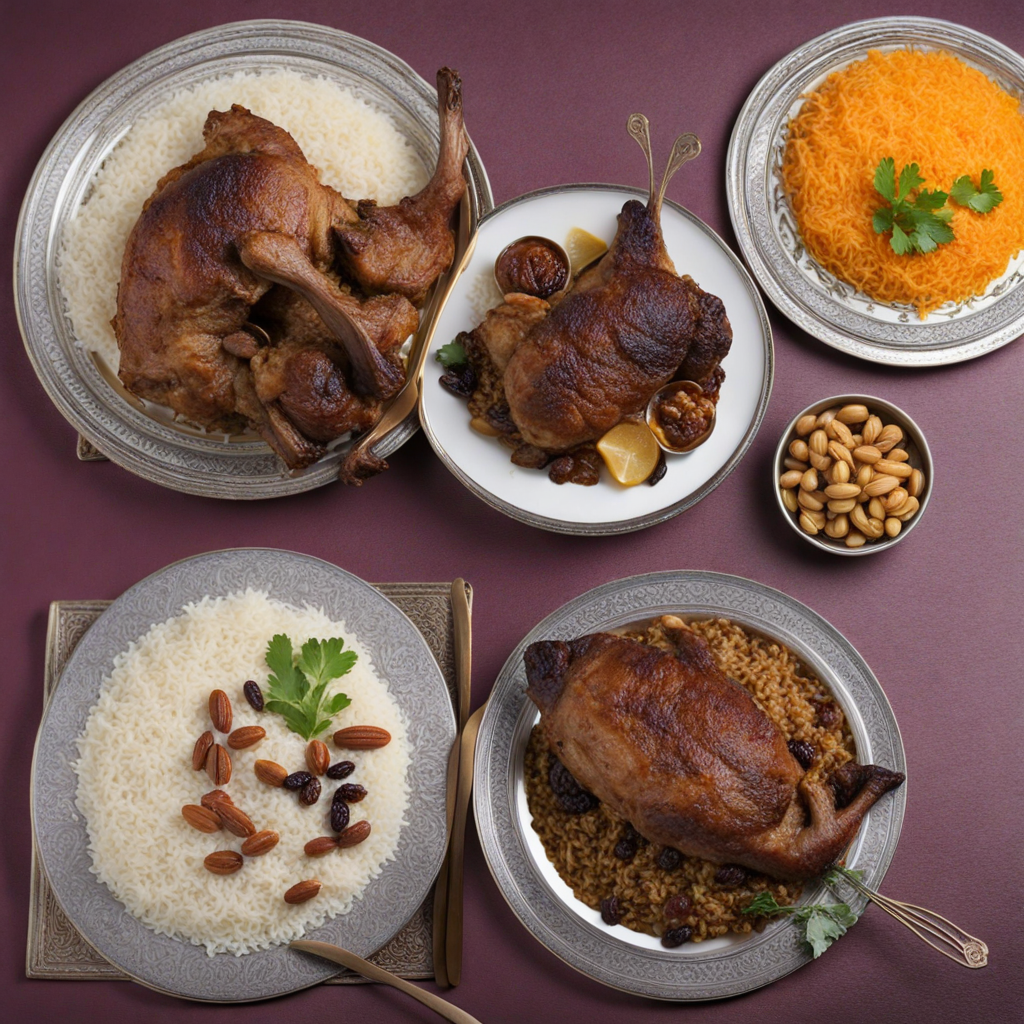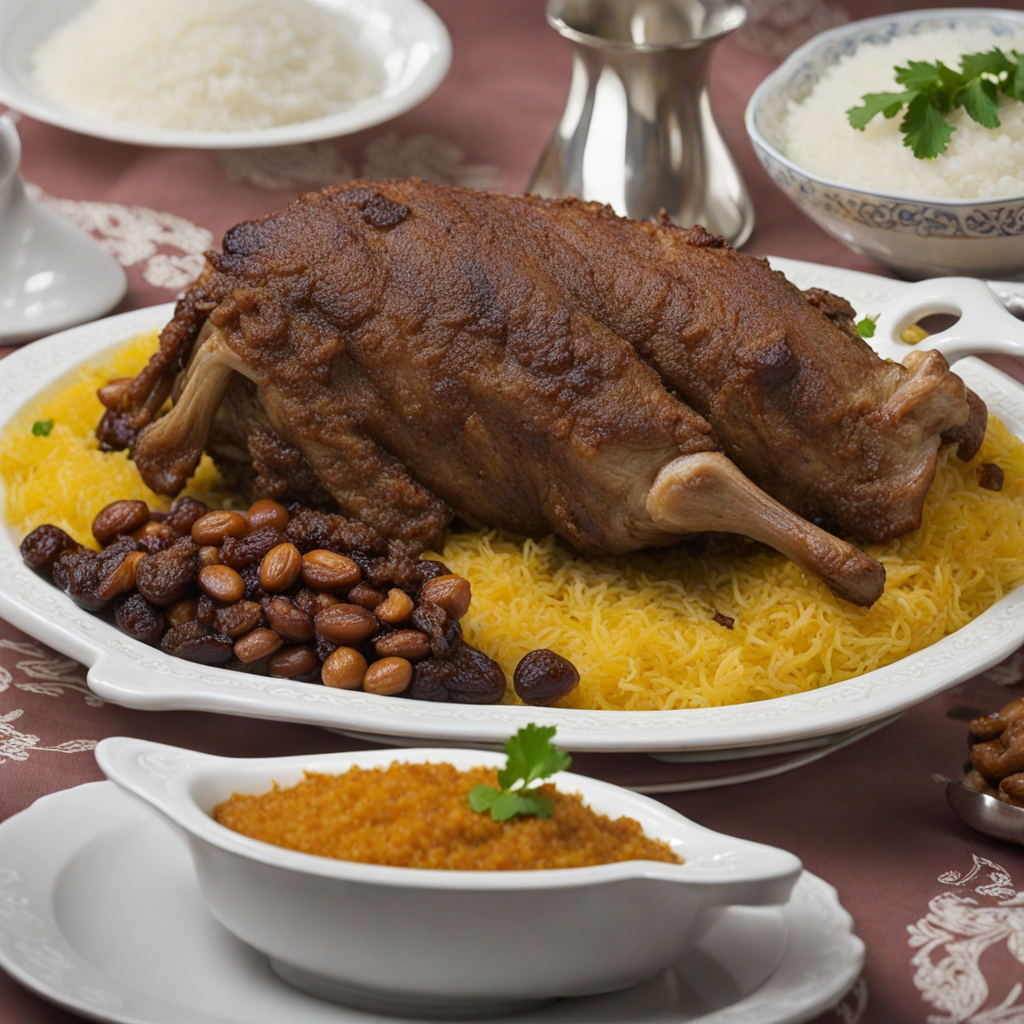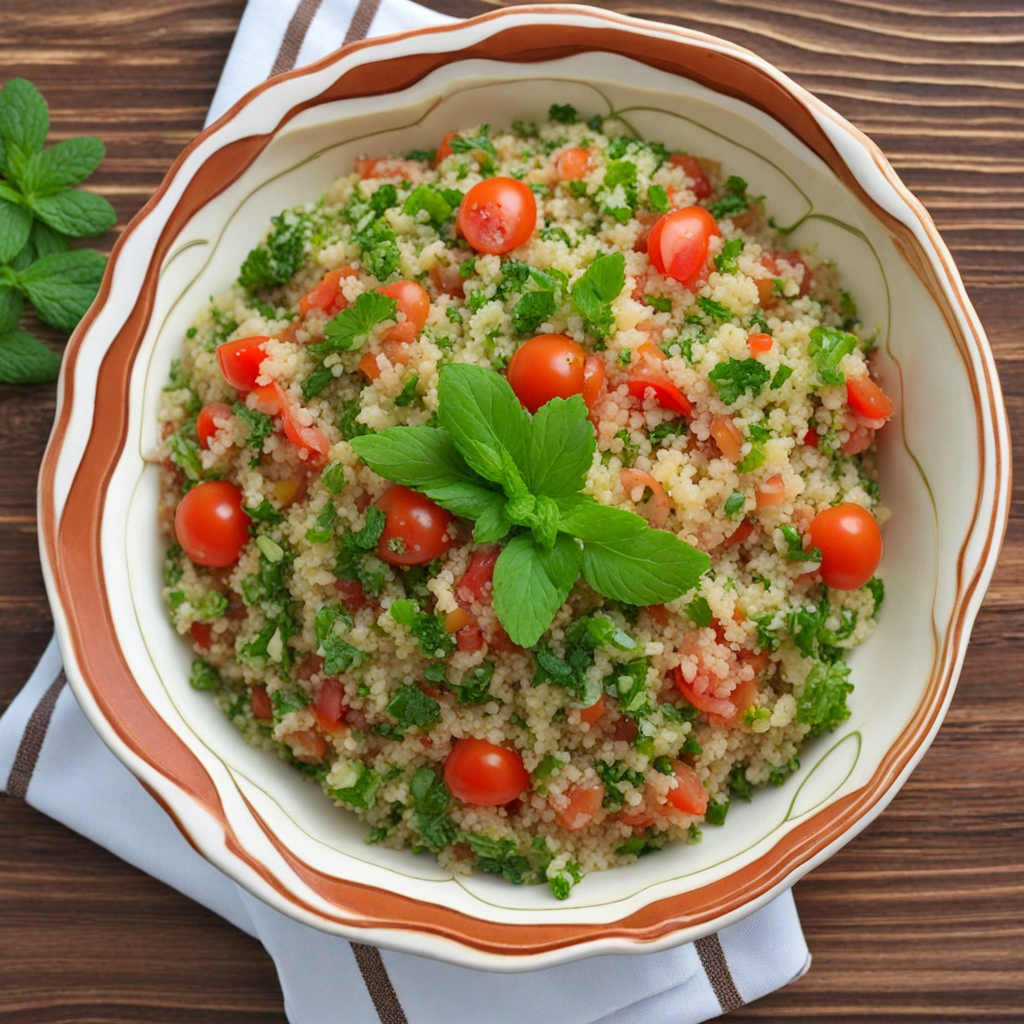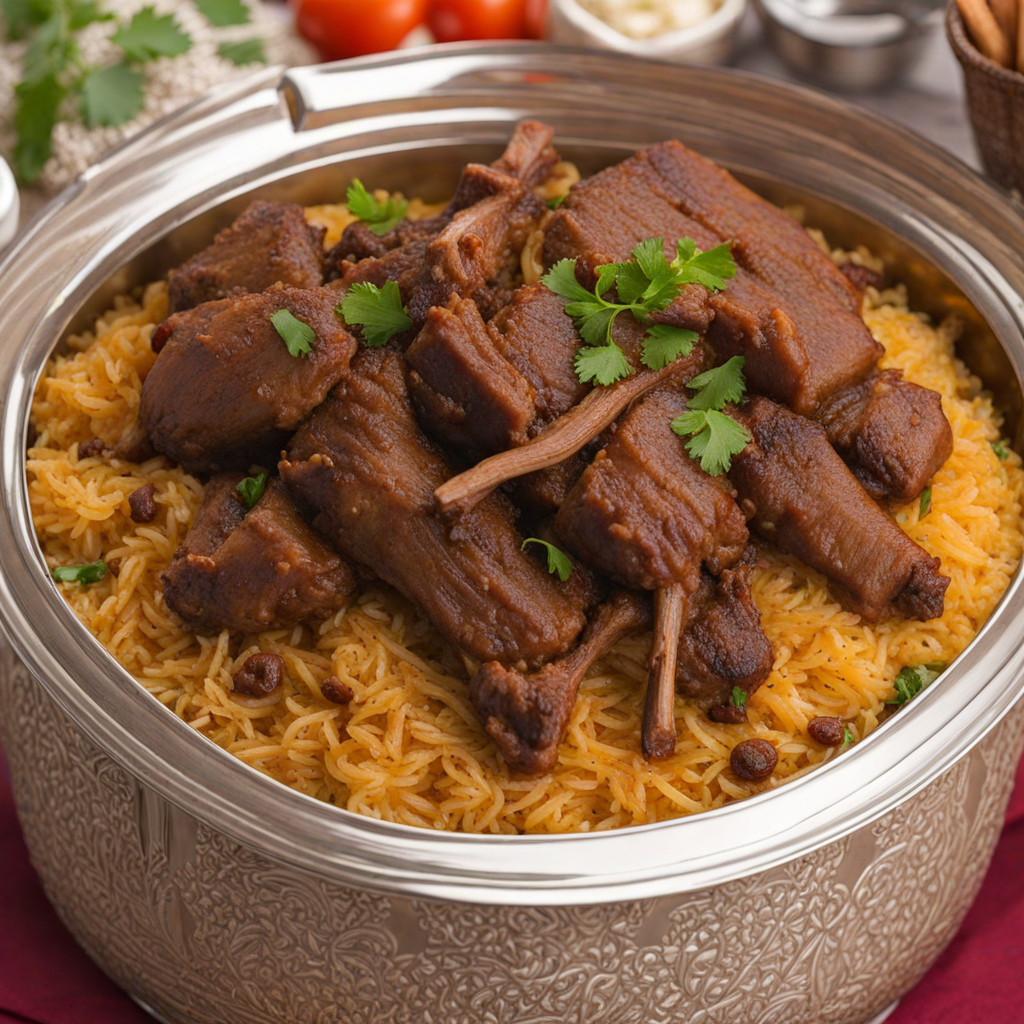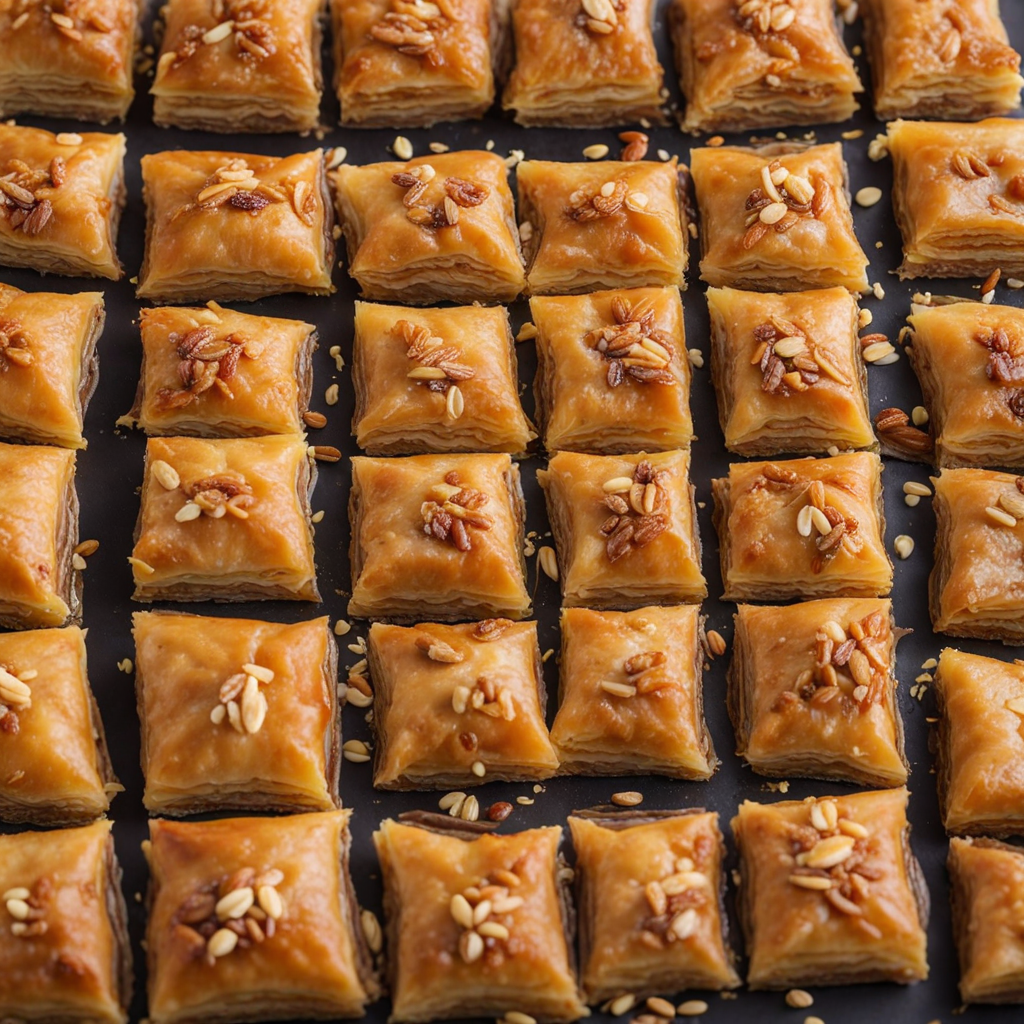Qouzi
Qouzi is a traditional Qatari dish that beautifully embodies the rich culinary heritage of the region. At its core, Qouzi features tender, slow-cooked lamb or goat, marinated with an aromatic blend of spices such as saffron, cardamom, and cinnamon. This meat is often accompanied by a fragrant rice, which is cooked separately and then layered with a mix of nuts and raisins, adding a delightful texture and sweetness that complements the savory flavors of the meat. The slow-cooking process allows the spices to infuse deeply, resulting in a dish that is both rich and comforting, perfect for sharing during family gatherings or special occasions. One of the standout elements of Qouzi is the balance of flavors and textures. The succulent meat, with its crispy exterior and juicy interior, pairs beautifully with the fluffy, spiced rice that has absorbed all the savory juices. The addition of toasted almonds, pine nuts, or cashews not only adds crunch but also enhances the dish's visual appeal. Often served on a large platter, Qouzi can be a centerpiece for gatherings, inviting everyone to dig in and enjoy a communal feast that celebrates Qatari culture. Accompanying Qouzi, you might find a selection of traditional side dishes, such as tangy salads or yogurt-based dips, which provide a refreshing contrast to the richness of the main dish. A squeeze of fresh lemon or a sprinkle of fresh herbs can elevate the flavors even further. Whether you're savoring Qouzi at a local restaurant or trying your hand at making it at home, this dish promises a unique and unforgettable taste experience that showcases the best of Qatari cuisine.
How It Became This Dish
The Rich History of Qatari Qoozi: A Culinary Gem #### Origins of Qoozi Qoozi, or "قوزي," is a traditional dish that holds a special place in Qatari cuisine, deeply rooted in the Gulf's history and culture. Its origins can be traced back to the Bedouin tribes of the Arabian Peninsula, where the harsh desert environment necessitated not just survival but also the art of hospitality and celebration. Qoozi, typically consisting of marinated lamb or goat stuffed with a range of spices, rice, and nuts, is a dish that reflects the ingenuity of the people who crafted it using available resources in a resource-scarce environment. The word "Qoozi" itself is believed to be derived from "kuz," which refers to the cooking of rice and meat together. The technique of slow-cooking meat over an open flame or in a tandoor-style oven was pivotal in the development of this dish. This cooking method not only enhanced the flavors but also ensured that the meat was tender and infused with the aromatic spices typical of the region. #### Cultural Significance In Qatar, Qoozi is more than just a meal; it is a symbol of hospitality, generosity, and community. The dish is often served at significant occasions such as weddings, religious festivals, and family gatherings. During Ramadan, for instance, it is common for families to prepare Qoozi for Iftar, the meal to break the fast. The act of sharing this dish embodies the spirit of togetherness and familial bonds that are central to Qatari society. Moreover, Qoozi is often associated with the concept of honor. When guests arrive, serving them Qoozi is a way of showing respect and appreciation. The preparation of Qoozi can be a communal activity, with family members gathering to cook and share stories, reinforcing social ties and fostering a sense of belonging. #### Ingredients and Preparation The traditional Qoozi recipe includes a whole lamb or goat, which is marinated with a blend of spices such as turmeric, cardamom, cinnamon, and nutmeg, alongside garlic and ginger for depth. The meat is then cooked slowly until tender. The rice, often basmati, is cooked separately and then mixed with saffron, raisins, and roasted nuts, typically almonds or pine nuts. The final presentation involves placing the meat atop the rice, garnished with additional nuts and sometimes boiled eggs, creating a visually stunning centerpiece for any meal. Over time, regional variations have emerged as the dish has been adapted to incorporate local ingredients and preferences. While the traditional preparation remains popular, some modern kitchens are experimenting with different meats, including chicken and even seafood, to cater to evolving tastes. However, the essence of Qoozi—the slow-cooked, spice-infused meat served over rich, fragrant rice—remains unchanged. #### Evolution Over Time As Qatar has evolved from a pearl-diving economy to a modern state with significant oil wealth, so too has the culinary landscape. The globalization of the food industry has introduced new flavors and techniques, but Qoozi has retained its traditional roots. In recent years, there has been a resurgence of interest in traditional Qatari cuisine, with chefs and home cooks alike seeking to preserve and promote their culinary heritage. The rise of Qatari food festivals and cultural events has played a significant role in this revival. Initiatives like the Qatar International Food Festival have provided a platform for local chefs to showcase Qoozi and other traditional dishes, educating both locals and tourists about the richness of Qatari cuisine. The emphasis on using organic and locally sourced ingredients has also given Qoozi a contemporary twist, appealing to a younger generation that values sustainability while maintaining their cultural roots. #### Qoozi in Modern Qatar Today, Qoozi is not just confined to homes or festive occasions; it has found its place in restaurants and cafes across Qatar. Establishments specializing in traditional Qatari cuisine now serve Qoozi, often alongside other local dishes such as Machbous (a spiced rice dish) and Harees (a wheat and meat dish). These eateries provide a casual yet authentic dining experience, allowing patrons to savor the flavors of their cultural heritage. Moreover, the dish has become a symbol of Qatari identity, especially in the face of globalization. As Qatar continues to grow as a cultural hub, the importance of traditional foods like Qoozi cannot be understated. It serves as a reminder of the country's history, its people, and the land that has nurtured them for centuries. #### Conclusion The history of Qoozi is a testament to the resilience and creativity of the Qatari people. From its origins among the Bedouin tribes to its status as a celebrated dish in modern Qatar, Qoozi encapsulates the essence of Qatari hospitality and culture. As Qatar navigates the complexities of the modern world while staying rooted in its traditions, Qoozi remains a beloved culinary symbol—one that brings people together, evokes nostalgia, and celebrates the rich tapestry of Qatari heritage. In every bite of Qoozi, one can taste the stories of generations past, the warmth of shared meals, and the enduring spirit of a nation that values its culinary traditions as much as its future.
You may like
Discover local flavors from Qatar


